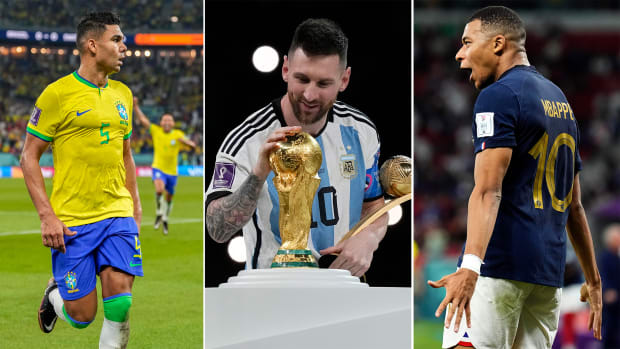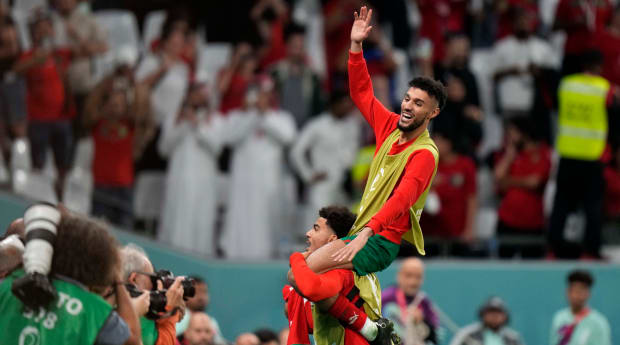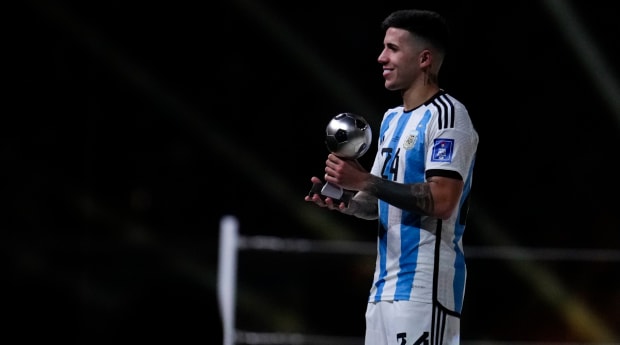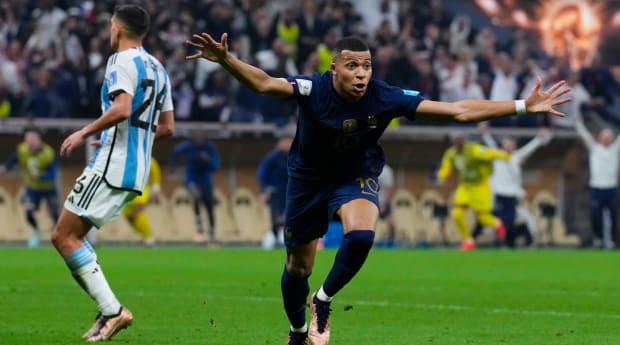After an eventful month, the 2022 World Cup came and went, ending with the iconic triumph of Lionel Messi’s Argentina.
But while Argentina and Kylian Mbappé’s France shined on the world’s biggest stage as they were expected to, other nations like Morocco and Croatia outdid most expectations, as did many of their players. They didn’t just leave a series of memorable goals, but also a lasting impression to earn a place in the 2022 World Cup Best XI.
Here is our team of the tournament from Qatar:

AP (3)
GK: Emiliano Martínez (Argentina)
Martínez won the Golden Glove, a frankly weird-looking trophy that he gestured with crudely almost as soon as he had been presented with it, and really there could be few doubts that he deserved it. His antics in the penalty shootout, both in the final and in the quarterfinal success over the Netherlands, are not to everybody’s taste and there probably needs to be a clear directive to prevent him throwing the ball away as he did before Aurélien Tchouaméni’s miss from the spot, but he was a commanding presence throughout and made a number of fine saves, most notably and more critically, his starfish block to kick away Randal Kolo Muani’s late chance in extra time in the final.
RB: Josip Juranović (Croatia)
Croatia’s strength at this World Cup was its resilience. There had been a feeling going in to the tournament that it was an old side and would struggle to replicate its semifinal appearance in Russia four years ago, but the capacity to absorb pressure and attack with calculated precision was still there. Achraf Hakimi played superbly at right back for Morocco and Kyle Walker excelled, but Juranović takes the right back spot for his tireless running. He averaged 2.0 tackles and 0.5 interceptions per game over his six games at the World Cup, as well as setting up a goal in the demolition of Canada.
CB: Romain Saïss (Morocco)
Morocco only conceded one goal in the tournament before the semifinal, and it was an own goal. It defended in an almost old-fashioned way, sitting deep, throwing bodies on the line, absorbing pressure. Nayef Aguerd, the other main Morocco center back, could have made the team, and Raphaël Varane, John Stones, Harry Souttar and Cristian Romero also impressed in the competition, but Saïss stood out, partly because he played at least some part in all six games before the third-place match, and partly because he played on courageously despite the obvious deteriorating state of his hamstring.
CB: Joško Gvardiol (Croatia)
Gvardiol is unfortunate that the moment he will probably end up being remembered for at this World Cup is being the target of Messi’s brilliant run to set up Argentina’s third goal in the semifinal. Messi ran at him slowly, as Messi does these days, then, having beaten him, checked, because Messi no longer has the acceleration to get away from everyone. Gvardiol recovered, so Messi beat him again and had enough room to cut the ball back for Julián Álvarez. But that was not representative of Gvardiol’s tournament overall. He was a beacon of strength in a ferocious Croatian backline and, at 20, will surely soon be moving on from RB Leipzig.

AP/Luca Bruno
LB: Noussair Mazraoui (Morocco)
There were far fewer impressive left backs at this World Cup than rightbacks. Mazraoui has been a bit-part player for Bayern in the Bundelsiga this season, but he showed his quality in Qatar, despite missing the quarterfinal win over Portugal. He averaged 2.8 tackles per game, testament to his aggression and constant snapping at opponents, but what was key to this Morocco was not just that held its shape well and defended diligently; it was that it also offered a threat on the break. The capacity of both fullbacks to get forward to support their wingers was key to that.
DM: Casemiro (Brazil)
Brazil’s decision to go into the quarterfinal against Croatia with just one holding midfielder raised eyebrows. To expect Lucas Paquetá and Neymar as players flanking him had seemed a gamble even against Serbia and South Korea, but they at least could be guaranteed to play defensively and present little challenge. Croatia’s experienced midfield was a different matter. As it turned out, what cost Brazil that game was a failure to take chances coupled with typical Croatian tenacity, which meant we never got to see if Tite would add a second holder against Argentina or France. But that the one-holder policy was even conceivable said much about the abilities and form of Casemiro, a great Pac-man of a midfielder who also scored a superb goal against Switzerland and helped create the third against South Korea.
RM: Sofyan Amrabat (Morocco)
In Morocco’s two great counterattacking successes, against Spain after penalties in the last 16 and 1–0 against Portugal in the quarterfinal, one midfielder stood out for his extraordinary energy: Amrabat. Everywhere the ball was, he seemed to be there, getting in the way. He averaged 3.2 regains and two fouls per game, an essential presence in preventing Morocco’s defence being overrun. A more creative option in a similar role might have been Jude Bellingham, while Frenkie de Jong also had a good tournament, but it was the Moroccan who inspired his side to the last four.

AP/Natacha Pisarenko
LM: Enzo Fernández (Argentina)
Fernández didn’t start either of Argentina’s first two games of the tournament but after coming off the bench he scored the second against Mexico, the goal that settled everybody down, and then started every game from then on. The 21-year-old had impressed for Benfica in the Champions League this season but, still, his easy authority came as something of a surprise. He could win the ball and he could pass the ball and, more than that, he could hurt opponents with his passing: He ended up with 3.5 regains per game as well as a pass completion rate of 87.6%, and was a worthy recipient of the award for Young Player of the Tournament.
CAM: Lionel Messi (Argentina)
It was Messi’s tournament. He may spend most of the game walking these days, but with a team built for him where he can still be the best player in the world. He needed a rugged and hard-working midfield to provide the platform, but with it he scored in every knockout game. He turned the crucial game against Mexico with a brilliant long-range strike. He plucked a ball from the sky and instigated and finished the move that brought the first goal against Australia, before orchestrating the second half. He laid on Nahuel Molina’s goal against the Netherlands with a stunning through ball, and set up Álvarez’s second against Croatia with a superb run. And then, the final—his penalty, the ball round the corner in the build-up to the second, the close range shot to make it 3–2, all the other chances he set up. And finally, the consecration of victory.
FWD: Julián Álvarez (Argentina)
Going into the tournament, the assumption was that Argentina’s center forward would be Lautaro Martínez, who had played for much of the 36-game unbeaten run. But he had a month in which he could barely hit the target and Argentina was fortunate it had Álvarez, a young and highly gifted alternative. He is quick and technically gifted and a very fine finisher, as his goal against Poland demonstrated. But he also has something else, a scrapper’s instinct, that was seen most clearly in his first goal against Croatia as he bundled through challenge after challengee before slamming the ball home, a goal reminiscent of Mario Kempes’s second against the Netherlands in the 1978 final. Álvarez got four goals in total but, just as important, he was the perfect foil for Messi.

AP/Natacha Pisarenko
FWD: Kylian Mbappé (France)
Mbappé had a strange World Cup. He finished as the Golden Boot winner with eight goals. He scored a hat trick in the final and two brilliant goals against Poland in the last 16. Yet between those games there was a weird drought, not merely of goals, but of involvement. Had it not been for Nicolás Otamendi’s clumsy foul to gift France a lifeline into the game, the story would have been of how Mbappé had faded from the tournament. And yet he is clearly a stupendous finisher, capable of scoring remarkable goals. Despite his lack of tracking or pressing, his disdain for defensive responsibility which makes him at times a liability, his goals mean he deserves his place in a team of a tournament over the likes of Harry Kane, Cody Gakpo and Richarlison.







